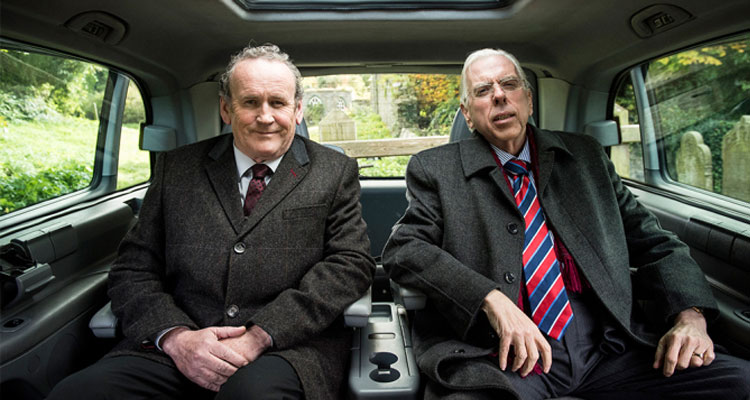Interview with Nick Hamm by Esther McCarthy
The Journey is a fictionalised account of the dramatic events that first formed the basis for one of the most unlikely friendships in politics. When Martin McGuinness and Ian Paisley first found themselves in close proximity on a plane journey from negotiations in St Andrews in Scotland, the awkward encounter sowed the first early seeds of what was to become a sincere and enduring friendship.
Regarded as a connection that contributed greatly to the peace process, the story is given a unique take – this time via a car journey – in the movie starring Timothy Spall as Paisley and Colm Meaney as McGuinness. We spoke to the film’s director, Nick Hamm, about bringing this unusual political drama to the big screen.
You’ve described The Journey and your approach to it as: ‘militant about the idea of peace’. What did you mean by that term?
“The thinking is this: these two guys managed to achieve something that has been elusive to Northern Ireland for over thirty years. This was an example of how you can move forward. The movie is a celebration of the idea of concession, the idea that we need to be talking. The idea that we need to actually engage with everybody else, that we need to see the other side. And if these two guys can do that, then other people can do it too.
By making the film, what we wanted to do was not only celebrate that friendship, and the result of that friendship, which was peace, but also do it in a very funny and witty way, to allow people the entertainment of enjoying the process. McGuinness was seen as responsible for all kinds of terrible things and Paisley for encouraging all kinds of terrible things. So when you take on a movie like this, you’re taking on two people who are necessarily terribly unpopular outside of their own group.”
Was it crucial, then, to make them sympathetic through shrewd casting and the use of humour, as we see in the film?
“You have to make them sympathetic otherwise you haven’t got a movie. The whole point about the film is you remove from the politician all the artifice of politics, if you like. All the artifice of being a parliamentarian – assistants, television crews, debating chambers. You remove all of that and you say: ‘You are now nothing, you’re in the back of a car, two grumpy old men in the back of a car’. In that sense you can make it about them as people.”
Tell us about the casting of Colm Meaney. He bears a strong resemblance to McGuinness and shares his wry sense of humour. Was it a no-brainer?
“(Laughs) You’re absolutely right. Number one, he’s one of Ireland’s best actors. A great film star and a great actor. If there’s a part that he was ever born to play, it’s this one. There’s a physical similarity, but there’s also a similarity in cadence, and in that incredible wit that he has. Colm’s part of the DNA of that republican movement. He comes from that culture and he embraces that. To a certain extent I also wanted that in the movie. I wanted to represent that in the most honest way that I could.”
Was the late Martin McGuinness involved at any stage of production?
“I met McGuinness about a year and a half ago, just before I started making the film. I met him in Derry, at Sinn Fein’s headquarters. We talked about the movie. We talked about the meeting with Ian Paisley, that journey that they took from St Andrew’s that was actually a real journey. That was one of the first times they actually met and talked. They hadn’t had an agreement at St Andrew’s. There wasn’t a peace accord. But what happened in that particular journey was that they actually did, for the first time, sort of speak to each other, acknowledge each other.
We didn’t dramatise that. I wanted to fictionalise their friendship. To say this is a great Irish story, a tribute to the way people can actually put aside their past and concentrate on their feature.
I never had any communication with McGuinness after that day. They were always respectful, they never asked to see the script, they never asked to see the cut of the movie.”
Words – Esther McCarthy
THE JOURNEY is at Irish cinemas from May 5th
